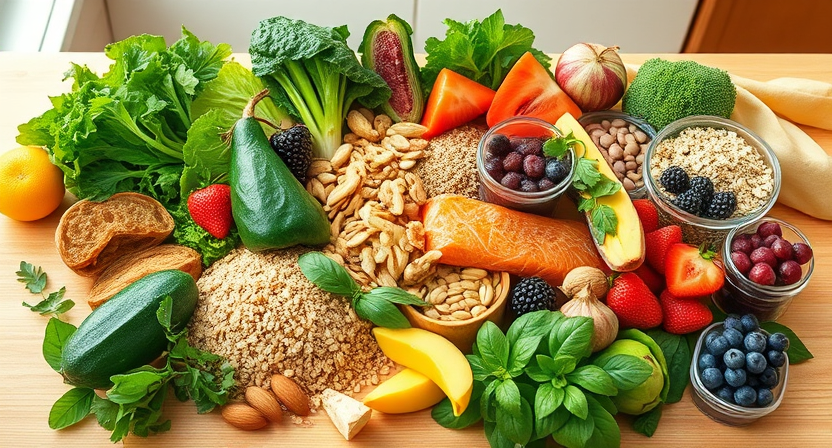
Top 10 Foods That Nourish Your Body and Mind
Foods rich in Omega-3 fatty acids

Omega-3 fatty acids are essential fats that play a key role in brain function and heart health. Foods rich in Omega-3 include fatty fish such as salmon, mackerel, and sardines. These fish are not only delicious but also packed with nutrients that are beneficial for overall well-being.
In addition to fatty fish, other sources of Omega-3 fatty acids include flaxseeds, chia seeds, and walnuts. These plant-based options are great for vegetarians and vegans looking to incorporate more Omega-3 into their diets. Including these foods in your meals can help reduce inflammation, improve cholesterol levels, and support cognitive function.
Leafy green vegetables packed with nutrients

Leafy green vegetables are a powerhouse of essential nutrients that support overall health and well-being. Rich in vitamins A, C, K, and folate, these vegetables play a crucial role in maintaining a strong immune system, promoting healthy skin, and aiding in proper blood clotting. The high fiber content in leafy greens also supports digestion and helps in maintaining a healthy weight.
In addition to vitamins, leafy green vegetables are also a great source of minerals like iron, calcium, and magnesium. Iron is essential for oxygen transport in the body, calcium is crucial for bone health, and magnesium is important for muscle function. Incorporating leafy greens like spinach, kale, and Swiss chard into your diet can provide a wide array of nutrients that are vital for maintaining optimal health.
Protein-rich foods for muscle repair and growth

Protein-rich foods play a crucial role in supporting muscle repair and growth. Consuming adequate amounts of protein is essential for athletes and individuals engaging in regular exercise to help rebuild muscle tissues that undergo damage during physical activity. Sources like lean meats, poultry, fish, eggs, dairy products, legumes, and tofu are all excellent options to incorporate into a balanced diet to ensure proper muscle maintenance and development.
Muscles rely on protein to repair and grow stronger, making it essential to include sufficient amounts of this macronutrient in your daily meals. Whether you are looking to increase muscle mass or simply maintain healthy muscle function, prioritizing protein-rich foods is key. Additionally, incorporating a variety of protein sources can help ensure you are getting a wide range of essential amino acids necessary for optimal muscle repair and growth.
Antioxidant-rich berries for cell protection

Berries are a delicious and nutritious way to boost your antioxidant intake, essential for protecting cells from damage caused by free radicals. Blueberries, raspberries, strawberries, and blackberries are all rich in antioxidants such as vitamin C, flavonoids, and polyphenols, which help combat oxidative stress in the body. Including a variety of berries in your diet can support overall health and reduce the risk of chronic diseases.
In addition to providing cell protection, antioxidant-rich berries offer a range of other health benefits. Berries are low in calories but high in fiber, making them a great choice for weight management and promoting digestive health. Furthermore, the anti-inflammatory properties of berries may help reduce inflammation in the body, which is linked to various health conditions. Incorporating an assortment of colorful berries into your meals or snacks can enhance both the flavor and nutritional value of your diet.
Whole grains for sustained energy

Whole grains are an excellent source of sustained energy due to their complex carbohydrates which are digested slowly by the body, providing a steady release of glucose into the bloodstream. This helps in maintaining stable blood sugar levels and avoiding energy crashes throughout the day. Examples of whole grains include brown rice, quinoa, barley, oats, and whole wheat.
In addition to being a great source of sustained energy, whole grains are also rich in important nutrients such as fiber, vitamins, and minerals. These nutrients play a crucial role in supporting overall health and well-being. By incorporating whole grains into your diet on a regular basis, you can fuel your body with the energy it needs to stay active and focused.
Fruits high in vitamin C for immune support

Oranges, strawberries, kiwi, and guava are all examples of fruits that are high in vitamin C, which plays a crucial role in supporting a healthy immune system. Vitamin C is a powerful antioxidant that helps protect cells from damage and boosts the production of white blood cells, which are essential for fighting off infections.
Including a variety of these vitamin C-rich fruits in your diet can help enhance your body’s ability to ward off illnesses and maintain overall health. Whether enjoyed as a snack, added to smoothies, or incorporated into salads, these fruits can provide the necessary vitamin C your immune system needs to function optimally.
Nuts and seeds for heart health

Nuts and seeds are excellent additions to a heart-healthy diet due to their rich content of unsaturated fats, fiber, and plant sterols. These nutrient-packed foods can help lower cholesterol levels, reduce inflammation, and support overall heart health.
Almonds, walnuts, chia seeds, and flaxseeds are particularly beneficial choices, as they provide omega-3 fatty acids and antioxidants that can protect the heart from damage and improve blood vessel function. Including a variety of nuts and seeds in your daily meals or snacks can be a simple yet effective way to promote a healthy heart and reduce the risk of cardiovascular diseases.
Probiotic-rich foods for gut health

Probiotic-rich foods play a crucial role in promoting a healthy gut. Yogurt, kefir, sauerkraut, and kimchi are excellent sources of probiotics that can help maintain the balance of good bacteria in the digestive system. These foods can aid in improving digestion and reducing gastrointestinal issues.
Incorporating probiotic-rich foods into your daily diet can also boost your immune system and support overall well-being. By nurturing a diverse range of beneficial bacteria in the gut, you can enhance nutrient absorption and reduce inflammation, contributing to improved digestive health.
Colorful vegetables for a variety of nutrients

Colorful vegetables offer a spectrum of essential nutrients that are vital for overall health and well-being. Vibrantly colored vegetables such as bell peppers, carrots, and tomatoes are rich in antioxidants like vitamin C and beta-carotene, which help protect cells from damage and support a healthy immune system. These vegetables also provide a range of vitamins, minerals, and phytonutrients that contribute to various bodily functions, making them a nutritious addition to any diet.
Incorporating a variety of colorful vegetables into meals can ensure a diverse intake of nutrients that promote optimal health. Vegetables like spinach, beets, and purple cabbage are not only visually appealing but also packed with vitamins, minerals, and antioxidants that support different aspects of health. By including a rainbow of vegetables in your diet, you can easily obtain a wide array of nutrients that work synergistically to keep your body functioning at its best.
Healthy fats like avocado and olive oil

Avocados and olive oil are excellent sources of healthy fats that can benefit overall health. Avocado, a creamy fruit rich in monounsaturated fats, offers numerous health benefits, including reducing inflammation and supporting heart health. Incorporating avocado into salads, smoothies, or sandwiches is a delicious way to enjoy its creamy texture and health-boosting properties.
Olive oil, a staple in Mediterranean cuisine, is known for its high content of monounsaturated fats and antioxidants. Its anti-inflammatory properties have been linked to reducing the risk of chronic diseases such as heart disease and diabetes. Drizzling olive oil over salads, using it as a cooking oil, or dipping bread in it are simple ways to incorporate this healthy fat into your diet and reap its health benefits.
Lean sources of protein for overall health

When it comes to maintaining overall health, incorporating lean sources of protein into your diet is crucial. These protein-rich foods not only help in muscle repair and growth, but they also provide essential nutrients for the body to function optimally. Opt for lean meats such as chicken, turkey, and fish to ensure you are getting a good balance of protein without excessive unhealthy fats.
Additionally, plant-based sources of protein like tofu, lentils, and beans are excellent options for those looking to reduce their consumption of animal products. These plant-based proteins not only offer a variety of nutrients but are also low in saturated fats, making them a heart-healthy choice. By incorporating a mix of lean animal and plant-based proteins into your meals, you can support your overall health and well-being.
Foods high in iron for proper oxygen transport

Iron is a crucial mineral that plays a vital role in the transport of oxygen within the body. Consuming foods rich in iron is essential to prevent iron deficiency anemia, a condition characterized by decreased red blood cell production and oxygen-carrying capacity. Some excellent sources of iron include red meat, poultry, fish, and legumes.
In addition to animal products, plant-based sources of iron such as spinach, lentils, quinoa, and fortified cereals can also help maintain optimal iron levels in the body. Pairing these iron-rich foods with sources of vitamin C, like citrus fruits or bell peppers, can enhance iron absorption. Ensuring an adequate intake of iron through a balanced diet is key to supporting overall health and well-being.
Calcium-rich foods for bone health

Calcium is essential for maintaining strong and healthy bones. Incorporating calcium-rich foods into your diet can help prevent osteoporosis and other bone-related issues. Dairy products such as milk, cheese, and yogurt are excellent sources of calcium that can support bone density.
Leafy green vegetables like kale, spinach, and broccoli are also rich in calcium. These nutrient-dense foods not only provide calcium but also offer a variety of other vitamins and minerals that contribute to overall bone health. Adding a mix of dairy products and leafy greens to your meals can help ensure you’re meeting your daily calcium needs for optimal bone strength.
Magnesium-rich foods for muscle function

Magnesium plays a crucial role in muscle function and is essential for various biochemical reactions in the body. Foods rich in magnesium can help support muscle contraction, relaxation, and overall performance. Incorporating magnesium-rich foods into your diet, such as leafy greens like spinach, nuts like almonds, and seeds like pumpkin seeds, can aid in maintaining optimal muscle function.
In addition to leafy greens, nuts, and seeds, other magnesium-rich foods include whole grains like brown rice, quinoa, and oats. These foods not only provide magnesium but also offer a range of other nutrients that can contribute to overall health and well-being. By ensuring you have an adequate intake of magnesium through your diet, you can help support your muscles in performing their various functions effectively.
Zinc-rich foods for immune function

Zinc is a crucial nutrient for supporting a healthy immune system. Including zinc-rich foods in your diet can help ensure your body has an ample supply of this essential mineral to support immune function. Foods such as oysters, beef, crab, and lobster are excellent sources of zinc, making them great additions to your diet to help strengthen your immune response.
In addition to animal-based sources, plant-based foods like pumpkin seeds, chickpeas, cashews, and almonds also contain significant amounts of zinc. By incorporating a variety of these zinc-rich foods into your meals, you can promote a robust immune system and better equip your body to ward off infections and illnesses.
Fiber-rich foods for digestion

Fiber is an essential nutrient that plays a crucial role in supporting healthy digestion. Foods rich in fiber help to promote regular bowel movements and prevent constipation. Additionally, fiber aids in maintaining a healthy gut environment by supporting the growth of beneficial bacteria.
Including a variety of fiber-rich foods in your diet, such as whole grains, fruits, vegetables, nuts, and seeds, can help improve overall digestion and prevent digestive issues. It is recommended to gradually increase fiber intake to allow your digestive system to adjust and avoid potential discomfort.
Potassium-rich foods for heart health

Potassium is a vital mineral that plays a crucial role in maintaining heart health. It helps regulate blood pressure and prevent the risk of cardiovascular diseases. Foods rich in potassium include bananas, sweet potatoes, spinach, and avocados, which can be easily incorporated into a balanced diet to support overall heart function.
In addition to maintaining heart health, potassium-rich foods can also help lower the risk of stroke and support healthy muscle function. Including a variety of potassium-rich foods in your daily meals can contribute to better heart health and overall well-being. It is important to prioritize these nutrient-dense foods to ensure adequate potassium intake for optimal heart function.
Vitamin E-rich foods for skin health

Vitamin E is a powerful antioxidant that plays a crucial role in maintaining healthy skin. Foods rich in vitamin E can help protect your skin from damage caused by free radicals and promote its overall health and appearance. Including vitamin E-rich foods in your diet can contribute to a youthful and glowing complexion.
Some excellent sources of vitamin E include almonds, sunflower seeds, and spinach. These foods can help nourish your skin from the inside out, supporting its elasticity and hydration. By incorporating these vitamin E-rich foods into your meals regularly, you can enhance your skin’s natural defenses and promote a radiant complexion.
Foods high in B vitamins for energy production

B vitamins are crucial for energy production in the body. Some of the best sources of B vitamins include whole grains, such as brown rice, quinoa, and oats. These grains not only provide a good dose of energy but also contain other essential nutrients for overall health.
Another excellent source of B vitamins is legumes, including beans, lentils, and chickpeas. These plant-based foods are not only high in protein but also rich in B vitamins, making them a great addition to a balanced diet. Incorporating these foods into your meals can help boost your energy levels and support your overall well-being.
Selenium-rich foods for thyroid function

Selenium plays a crucial role in supporting thyroid function by aiding in the production of thyroid hormones. Incorporating selenium-rich foods into your diet can help ensure that your thyroid is functioning optimally. Some foods rich in selenium include Brazil nuts, sunflower seeds, fish, poultry, and eggs.
A deficiency in selenium can lead to thyroid disorders, impacting metabolism and overall health. By including selenium-rich foods in your meals, you can support your thyroid’s health and ensure proper hormone production. Remember to incorporate a variety of selenium sources into your diet to maintain optimal thyroid function.
– Brazil nuts
– Sunflower seeds
– Fish
– Poultry
– Eggs
By consuming these selenium-rich foods, you can help support your thyroid function and overall health. It is important to maintain a balanced diet that includes a variety of nutrients, including selenium, to ensure proper hormone production and metabolism. Don’t forget to consult with a healthcare professional or nutritionist for personalized advice on incorporating selenium-rich foods into your diet. Prioritizing your thyroid health through nutrition can have long-term benefits for your well-being.











